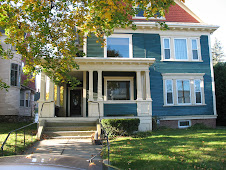My last entry referred to an article on Brain Blog entitled, “Can This Economic Down Turn Lead to Better Psychosocial Health?,” an article that explores positive emerging trends which appear to be fueled by the daunting environmental, economic, and social crises we currently face. While the title may very well seem offensive at first, it ultimately offered the reader some semblance of hope.
In “The Waking Up Syndrome,” published in Hope Dance magazine by Sara Anne Edwards and Linda Buzzell, the authors outline a pattern of behavior that they believe often accompanies a crisis, and which they describe as, ‘the waking up syndrome.’ This process is broken down into six stages; (1) denial, (2) semi-consciousness, (3) the moment of realization, (4) a point of no return, (5) despair, guilt, hopelessness, powerlessness, and (6) acceptance, empowerment, action.
While each stage that Edwards and Buzzell describes is relevant (I was firmly planted in stage 5 for a very long time,) the final stage of this process is what I want to address here. According to the authors, it is here that we come to recognize that we no longer need to surrender to our “current and emerging reality.” Instead, we are liberated to “pursue what James Kunstler calls ‘the intelligent response,’ seeking and taking whatever creative, constructive action will best sustain those aspects of life that are truly most important to us in the context of the changes unfolding around us. At this point our curiosity and creativity kick in and we can begin following our natural instincts to find what is both feasible and rewarding to safeguard ourselves, our families, our communities and the planet.”
On the whole, I believe that very few of us feel the kind of empowerment and commitment that will be necessary to implement the sweeping and substantial changes that will be necessary to move us toward a more rewarding and sustainable way of life, however, portents of change and small beams of hope are shining everywhere. I witness them in the more insistent demand for alternative sources of energy, conservation, and simpler and ultimately more satisfying ways of living. Public radio announced recently that library visits are increasing, visits to farmers markets are on the rise, and there is a renewed interest in food coops, child coops, and car pooling. We are starting to throw away less, reuse more, and we have begun to convert city lots and back yards to gardens.
When I was writing BirthQuake in the late nineties, I was surrounded by a barrage of bad news about people, places, and even our planet in peril. Today it seems that the threats have amplified, the warning signs have multiplied, and the ominous march of fear and uncertainty has moved even closer to home. And yet, ten years later, while my concerns have deepened, I have also found more reasons to hope. Is it possible that so much of the suffering that I witness here in my country are not the signs of an ultimate break down but are instead the labor pains that will ultimately herald a break through.
Watch:
Finding Your Power: Part One
Finding Your Power: Part Two
Finding Your Power: Part Three
Finding Your Power: Part Four
Finding Your Power: Part Five
Finding Your Power: Part Six
Finding Your Power: Part Seven
The Shift
Tuesday, September 23, 2008
Subscribe to:
Post Comments (Atom)




No comments:
Post a Comment